There are a number of narcissist blame shifting examples used by the narc to avoid taking any kind of responsibility for their shitty behaviour.
Essentially, blame shifting is where a person deflects any blame that is being directed at them, straight back onto the person who is trying to voice their concerns. Therefore, the original person who was being blamed avoids having to take any accountability for their own actions by dumping it directly back onto the ‘accuser.’
The impacts of blame shifting in relationships are incredibly detrimental to one’s self-worth, identity and ability to be able to confidently make decisions.
Blame shifting is downright sneaky emotional abuse. Read on to find out more about how narcissists commonly shift the blame to avoid having to be accountable for their own words and actions.
This post contains affiliate links, for more information, see our disclosures here.
What is Narcissist Blame Shifting?

Blame shifting is a manipulation tactic where the narcissist immediately shifts any blame placed on them directly back onto the accuser. By moving the focus right back onto the other person, it immediately puts that person in a position where they feel the need to defend themselves… even though they were the ones who were wronged in the first place.
Sound like a brain wrench? It sure is.
Although blame shifting is as simple and insidious as that, the techniques narcissists use to actually roll out this manipulation tactic can be quite cloak-and-dagger.
Narcissist blame shifting can be a form of gaslighting as they have a real knack of twisting reality to benefit their own agenda. This manipulation of reality can leave the victim questioning their own thoughts and memories of the event and not feel clear on what’s true and real.
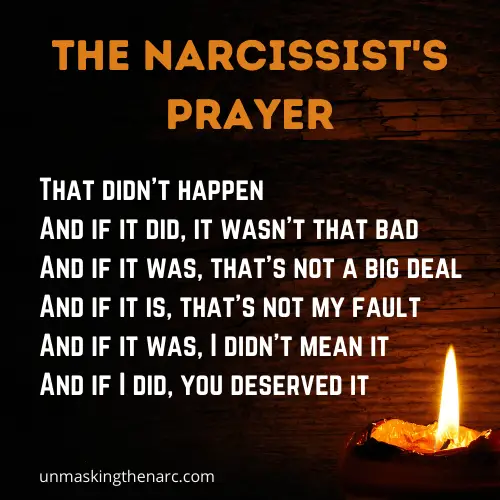
| READ: A Narcissist’s Prayer Unravelled → |
Narcissists will intentionally attack your vulnerabilities and weaknesses of…
- Not liking conflict
- Needing to be a peace-keeper
- Being overly empathetic and compassionate
- Being reliant on them financially or physically
- Low self-worth
- Inability to make your own firm decisions
- Tendency to doubt yourself
Basically, the narcissist will become the ‘victim,’ putting you in the place of ‘perpetrator,’ instead of it being the other way around. Initially, the narcissist was the one to do wrong, yet they’ll completely flip the script back around onto you.

Why Do Narcissists Deflect Blame?
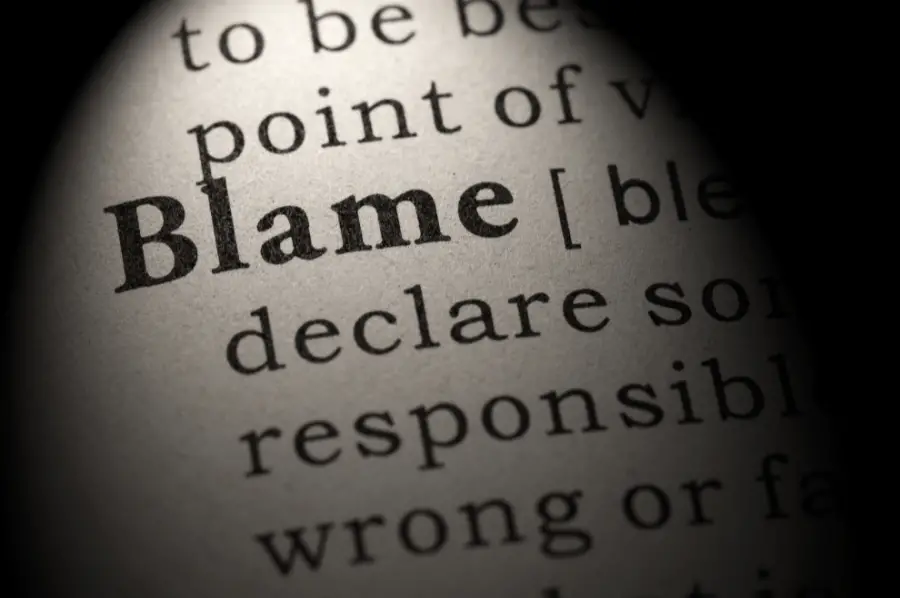
First off the bat, a narcissist is all about themselves. They genuinely don’t see a problem with their self-centredness and the way they treat others. They see themselves as always being right, especially being the highly competitive creatures that they are.
Reasons narcissists deflect blame:
- Taking the blame hurts their ego
- To avoid responsibility
- For power & control
- To further validate their false illusion that they are ‘perfect’
A narcissist cannot handle the blow to their ego that shows them being wrong. That is just too unbearable for them to handle.
Therefore, within an instant, they will flip the blame back around onto you. If you’re not around to wear the blame, they’ll blame the kids, the dog, the world or even god himself before ever conceding to the fact that they were in the wrong.
It’s extremely frustrating to witness and even more infuriating to be entangled in because the possibility of a reasonable, adult conversation is just not possible with a narcissist.
Think of an overgrown toddler in an adult’s body.

Narcissist Blame Shifting Examples
Refusing to talk about the past
Good luck trying to bring up anything from the past that the narcissist does not want to take responsibility for. The past can be something that happened last year, last week, yesterday or even that morning.
“Why do you always have to bring up the past? You really need to just let things go. This is the whole reason our relationship is on the rocks!”
In the narcissist’s reality, you have effectively forgiven everything that has happened in the past just by staying with them. They expect that whatever they did in the past stays in the past. You’re only allowed to move forward from here on in.
But… when a narcissist wants to bring up things about you from the past, the rules are completely different.
If they want to gaslight you, they will not hesitate to get you caught up in an entire world salad of past events, which they’ll twist around and sling back at you. Before you know it, you’re trying to defend yourself from all sorts of things that shouldn’t even be issues.
TACTIC – Refusing the talk about the past
If you try to address something that the narcissist has said or done, they will invalidate you and blame you for bringing up the past. Instead of being able to have an adult conversation and grow the relationship in a positive way, you’ll be immediately shut down and blamed for even broaching the issue.
Negative Relationship Outcome
You know that it’s not safe to bring up past events with the narcissist. This results in bottling things up instead of being able to reasonably discuss them.
Bringing up the past

Yep, I know, this is in complete opposition to the point above. But hey, welcome to the dynamics of a narcissist.
Narcissists are liars and hypocrites – “Do as I say, not as I do.”
If narcissists can bring up past events to shift the current blame onto you, they will absolutely do so.
If you accuse them of being disrespectful, they’ll immediately draw on a past event that they can use to cast you in a disrespectful light.
Let’s just say you’re trying to tell the narcissist that you feel they don’t listen to you properly. The narcissist will have three past examples of you not listening, armed and ready to go.
Whether their examples are true or fictitious it matters not to the narcissist. As long as your confusion and the need to defend yourself continue. As long as you keep reacting, they will continue to receive supply, which inevitably feeds the false illusion that they are perfect and can do no wrong, with all of the blame always falling onto you.
| READ: Narc Supply Explained → |
This is where the narcissist will so often project their own shortcomings onto you, effectively blaming you for many of the things that they actually do. You will be kept in a state of confusion, to the point where you can’t even remember what actually happened any more.
TACTIC – Bringing up the past
The narcissist will deflect any blame directed at them, straight onto something that you’ve done in the past, which takes the focus off them. Before you know it, you’re trying to defend yourself against accusations of things that you’ve never even said or done.
Negative Relationship Outcome
Instead of the narcissist looking at their own behaviour, you’re left having to defend yourself against false accusations of past events.
Making themselves the victim
A narcissist can easily shift the blame from themselves and onto someone else by painting themselves as the victim.
This is where they may act extremely upset (crocodile tears and all) with how they have been unfairly ‘wronged,’ ‘labelled,’ or ‘treated.’
The ploy here is to pull at the heartstrings of those around them who will be empathetic to their plight.
This narcissist blame shifting example can work extremely well in a public space where the narc can accuse the other person of something. Most people in the room are only hearing and seeing what’s transpiring in that moment, so they will often sympathise with the narcissist.
Since other people aren’t generally privy to the backstory or the manipulation tactics of the narcissist, this can be rather traumatic for the narcissist’s victim, who is now being publicly slandered.
I had an incident with my ex who publicly told me to, “Shut the f*** up,” in front of a group of our friends.
I felt completely ashamed and the mutual friends were all shocked.
When I confronted him about it later on and told him how humiliated I was, he totally flipped the script and made himself out to be the victim.
“YOU were humiliated? How do you think I felt? You totally interrupted me in front of everyone!”
Honestly, I was so confused at how he could possibly blame me for his shitty behaviour, I actually had no response for him. I was gobsmacked. Plus, I honestly do not recall interrupting him. He just flipped the script to serve himself.
TACTIC – Making themselves the victim
A narcissist will often portray themselves as the victim, painting the picture that their victimhood far outweighs their bad behaviour. When the narcissist is depicted as the victim, it quite often means that the other person (the true victim) will be painted as the perpetrator.
Negative Relationship Outcome
People will feel compelled to show empathy towards the narcissist, meaning that the narc gets to evade having to take any responsibility.
Tell you to leave if you don’t like their behaviour

Another narcissist blame shifting technique is to put it all back onto you for not liking their behaviour.
A narcissist is completely entitled and automatically thinks that they have the right to act however they like. No cares are given as to how their actions affect those around them. If you don’t like their behaviour, that’s not their problem… it’s yours!
“I am who I am. If you don’t like it, there’s the door.”
As far as the narcissist is concerned, it’s not their fault that you’re too sensitive or that you can’t take a joke. Never mind the fact that they’re completely disrespectful, hurtful and self-absorbed.
Honestly, when a narcissist uses the words, “if you don’t like it, then leave,” we should all be taking them at their word and actually walk out that door.
However, the problem lies within our insecurities and inner wounds, which the narc knows all too well and loves to toy with.
It’s our internal fears, which have been honed in on and triggered throughout the narcissistic relationship, that keep us standing there. Low self-worth, fear of being alone, not being able to support ourselves without them… the list goes on.
TACTIC – Tell you to leave if you don’t like their behaviour
Narcissists refuse to self-reflect and take responsibility for how their words and actions affect others. If someone doesn’t like something that they’ve done, instead of being able to talk it out with them, they will just place the blame on you and tell you to leave.
Negative Relationship Outcome
There is no chance for relationship growth with a narcissist. They will tell you to leave before looking at their own behaviour.
Control the storyline with other people
A narcissist’s ego is like a fragile eggshell that can be easily fractured at any given moment. To protect their ego, they spend their lives building false illusions about themselves, which they project out into the world.
The people closest to the narcissist will see moments of the real them through their grand facade. But they must manipulate these people and have them questioning their reality so that they can’t decipher what’s real and what’s false. This confusion protects the narcissist from people finding out who they really are inside – a scared child, filled with deep shame and self-loathing.
Given that their whole illusion is built on false stories of grandiosity and perfection, they cannot bear the thought of anyone hearing stories of what they’re truly like behind closed doors.
The narcissist’s blame-shifting game here is to get to others before you can. That way, they can lay out their fictional storyline of events, which will ultimately peg them as the victim and you as the perpetrator.
They will target mutual friends, family, co-workers… anyone who will listen to their bullshit stories.
It’s important in this case to remember that those who truly know you will have you back no matter what stories the narcissist spins.
TACTIC – Control the storyline with other people
Narcissists are so skilled at warping other people’s reality to fit in with their storyline. They will get into the ears of others before you have a chance to talk to them first. That way people are already set up with the narcissist’s false story without you having a chance to convey the truth. You will inevitably be painted as the perpetrator, with them being the poor victim.
Negative Relationship Outcome
You may be publicly smeared so that the narcissist can appear to be the victim at the hands of you.
Gaslight you

One of the most-used narcissist blame shifting techniques is to simply gaslight the other person. Gaslighting is where the narc has their victim doubting their own reality due to covert manipulation tactics.
Common gaslighting techniques:
- Opposing your memory of things
- Denying conversations and events
- Withholding conversation, love and affection
- Invalidating your feelings and concerns
| READ: 100+ Gaslighting Terms Narcs Use → |
You can see in the example below how they can quickly deflect any attention off themselves, straight back onto the person who’s blaming them. They take zero responsibility for their role and shift all of the blame onto someone else, effectively wiping their hands in the process.
Gaslighting narcissist blame shifting examples:
- “You’re crazy, I never did that. I think you need help.”
- “You know your memory is no good. That’s not how I said it at all.”
- “It’s not my problem you’re too sensitive.”
- “I don’t have time for your games.”
- “If you didn’t provoke me in the first place, you wouldn’t be in this mess.”
- “You’re the one with the problem here, not me.”
TACTIC – Gaslight you
Narcissists love to mess with people’s reality as a form of manipulation. They will oppose your memory, deny conversations and events, withhold love and affection, plus invalidate you. All of these things take the focus off them having to take responsibility, shifting the blame and making out that there’s something wrong with you.
Negative Relationship Outcome
You cannot win with a gaslighting narcissist. The more you engage, the deeper you end up down their rabbit hole.
Guilt-trip you
Covert narcissists, in particular, are masters of the guilt trip. They can turn on the tears at the drop of a hat if it will pull at the heartstrings of their victim and get them off the hook.
Although narcissists are emotionally devoid of feelings when it comes to others, they are actually the most sensitive people on the planet! Any little perceived slight against them will have them flying off the rails.
When my ex had really gone too far and couldn’t deny his actions, he would curl up on the bed with real tears rolling down his cheeks. Being a co-dependent empath, that was the key straight to my compassionate heart and I would find myself comforting him, all while he got to play victim and evade responsibility for his behaviour.
| READ: How Narcissists Destroy Empaths → |
Before I knew it he would be totally shifting the blame, saying things like, “I don’t know why I do that, it’s like something takes over me.” I was totally guilted into feeling sorry for him instead of focussing on his shitty behaviour.
Guilting someone = emotional blackmail
I know of another covert narcissist who’s masterful at guilt-tripping everyone around her to be constantly in a state of feeling sorry for her. Therefore, she manages to take zero responsibility for anything and guilt-trips anyone who tries to get her to do otherwise.
TACTIC – Guilt-trip you
If the narcissist needs to shift the blame from themselves, they can easily guilt-trip those around them into feeling sorry for them. The pity ends up getting them off the hook for their behaviour, hence seeing them take zero responsibility.
Negative Relationship Outcome
You feel sorry for the narcissist and cut them some slack or console them, instead of them having to look at their behaviour.
Throw accusations at you

Throwing accusations at someone else is the quickest way to execute narcissist blame shifting. In the blink of an eye, the focus is off the narc and straight onto the other person.
Accusation narcissist blame shifting examples:
- “If you paid me a bit more attention I wouldn’t have to cheat on you.”
- “You violated my privacy by looking at my phone,” – after noticing questionable text messages.
- “I would have gotten you a birthday gift if you didn’t put on such a performance yesterday.”
- “If you did as I asked I wouldn’t have to yell at you.”
The narcissist needs it to appear as though the situation is all the other person’s fault. If they had obeyed the narc or hadn’t done something the narc didn’t like, then the narcissist wouldn’t have reacted that way.
A narcissist’s ‘love’ is completely conditional on you behaving the way they expect.
The narcissist doesn’t take any responsibility for their reactive behaviour but puts it all back onto the other person.
TACTIC – Throws accusations at you
The narcissist will accuse the other person of various things to take the focus off them and make the other person look like the bad guy. It’s the other person’s fault that they cheated, invalidated, ignored or flew into a rage.
Negative Relationship Outcome
You feel completely confused as to how the narcissist reacted or why they behaved the way they did, then blamed you for it. You find yourself in a position of needing to defend yourself.
Doesn’t deny it, but doesn’t care
The final narcissist blame shifting example is where they don’t deny their actions, but they just don’t care.
Say you confront the narcissist about a certain behaviour, event or action that is negatively affecting you. It may be so obvious that even the narcissist can’t back out of this one. So, they just shrug their shoulders and reply with, “yeah… and?”
“Yeah… and? What’s your point?”
This tactic won’t see them admitting fault, but they will admit that it happened.
It could be a scenario where it’s clear that a boyfriend is meeting other women. When confronted about it, he might say, “So what? Am I not allowed to talk to anyone else?”
Another example is where a partner is overspending money on shopping sprees, which is putting financial pressure on the family. The reply could be something like, “I earn my fair share, I can spend it however I like. You’re not my mother.”
TACTIC – Doesn’t deny it, but doesn’t care
The narcissist will not deny the action or event that puts the blame on them, but they will not admit fault or take responsibility for the repercussions.
Negative Relationship Outcome
You will feel at a loss because the narcissist has justified their actions in a way that leaves you feeling powerless.

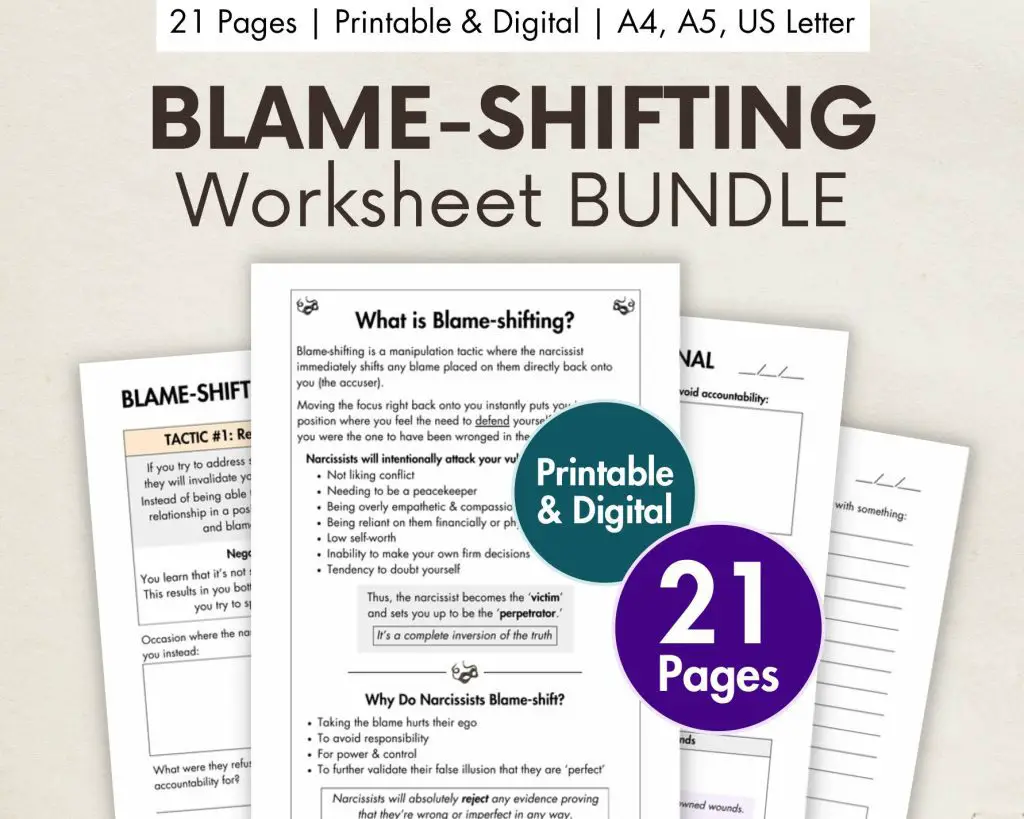
Blame-shifting
Worksheets & Journal
Understand the narcissist’s projections & heal from them for good.
- Blame-shifting Explained
- 9 Worksheets
- 8 Journal Pages
- 3 Notes Pages
- PRINTABLE & DIGITAL

How to Deal with Narcissist Blame Shifting
Blame shifting is a form of abuse that can happen in any relationship, not just narcissistic ones. However, you can bet that in a relationship with a narcissist, you are 100% guaranteed to experience many, if not all, of the above narcissist blame shifting examples.
When someone consistently refuses to be accountable for themselves and their actions, it inevitably wears down the other party in the relationship, causing trauma and mental health issues.
By the time we enter adulthood, we should each be well and truly taking responsibility for our own behaviour. Unfortunately, narcissists were emotionally stunted at an early age and tend to behave in more of a child-like manner.
Impacts of blame shifting in relationships:
- Believe that everything is your fault – Over time, you tend to start believing that most things are in fact your fault through your diminished sense of self-worth.
- Communication shuts down – The blamer demonstrates that they are not approachable, but rather, extremely judgemental. You don’t feel safe to open up and have discussions with them anymore, especially about emotions, concerns, hopes, fears and dreams.
- Inability to make decisions – You don’t feel able to make the ‘right’ decisions without the blame-shifter making you feel like you’re always wrong.
- Resentment breeds – Over time, you’ll end up resenting your partner because you’re never good enough. You can never do anything right.
- Low self-worth – Through constantly questioning yourself, your decision-making and your ability to do things ‘right,’ your self-esteem and self-worth suffer greatly.
- Intimacy decreases – When you don’t feel close to your partner and you’re battling unworthiness, intimacy naturally takes a dive.
- Loneliness – Being in a relationship with someone who puts you down and judges you, instead of being supportive and inclusive, is incredibly lonely, especially with reduced intimacy.
- Perpetuating the cycle – When someone has low self-worth, they are willing to accept much worse behaviour than someone who has a strong and healthy sense of self. You’ll find yourself stuck in a cycle, which is incredibly difficult to even see, let alone get out of.
Even though narcissists will never self-reflect or take accountability, that doesn’t mean that you have to wear the blame that they want to dump on you.
Here are some ways to deal with narcissist blame shifting, so that you can start to take your power back from the narcissist.
How to deal with narcissist blame shifting:
- Don’t react – the narcissist wants you to bite so that they can pull you down into their playing field.
- Calmly disagree – let the narcissist know that you disagree, but do not take the bait by entering their argument.
- Ignore them – disengage from the conversation by walking away, hanging up the phone or not responding to the message.
- Validate their reaction – you can say, “I’m sorry you had that experience,” without taking on any of their projected blame.
- Shift it to a ‘shared’ blame – use “we” or “us” to make it a shared responsibility instead of them putting it all onto you.
- Set your boundary – let them know that if they continue to talk to you/ treat you that way, you will be leaving.
- Agree to disagree – end the conversation by agreeing to disagree and do not engage any further.

Support for People Experiencing Blame Shifting
If you are or have previously been in a relationship where blame shifting was frequently used, it’s so important to have support. This could be in the form of a trusted friend or family member, who you can safely talk to.
Join a like-minded Facebook group, where you’re able to talk out your experiences with others who are also going through it. This all helps in validating and holding your reality, meaning that you’re less likely to be sucked into the narcissist’s false reality.
Therapy or counselling sessions are highly recommended for people who’ve suffered long-term emotional and mental abuse. If you’re hesitant about initiating counselling, here are 10 things about therapy that will make you feel better.
Tips for healing from an abusive relationship:
- TIME – There is no time limit on how long it takes to heal from an abusive relationship. Give yourself all the time that you need. I would personally recommend not getting into another relationship until you’ve fully healed your inner traumas.
- UNDERSTANDING – It’s important to understand what actually went on in the relationship, especially after being held in a state of confusion for so long.
- ACCEPTANCE – Accept that it has happened and focus on how you can become a better version of yourself as you come out the other side of the healing.
- BE KIND TO YOURSELF – It’s easy to hate on yourself for allowing it to happen, but honey, you didn’t realise that you were being abused. The narcissist is a master manipulator. You were simply a kind-hearted soul who was taken advantage of. Don’t lose your inner beauty. That’s what attracted the narc to begin with – you exude so much light that they will never have the ability to hold.
Really, the only way to level up is to raise your vibration to a level beyond where the narcissist resides. By healing and releasing your deep inner wounds, which the narcissist so easily located and shone a light on, you will never again fall prey to that energy. Narcissists simply cannot exist in that higher state of being.


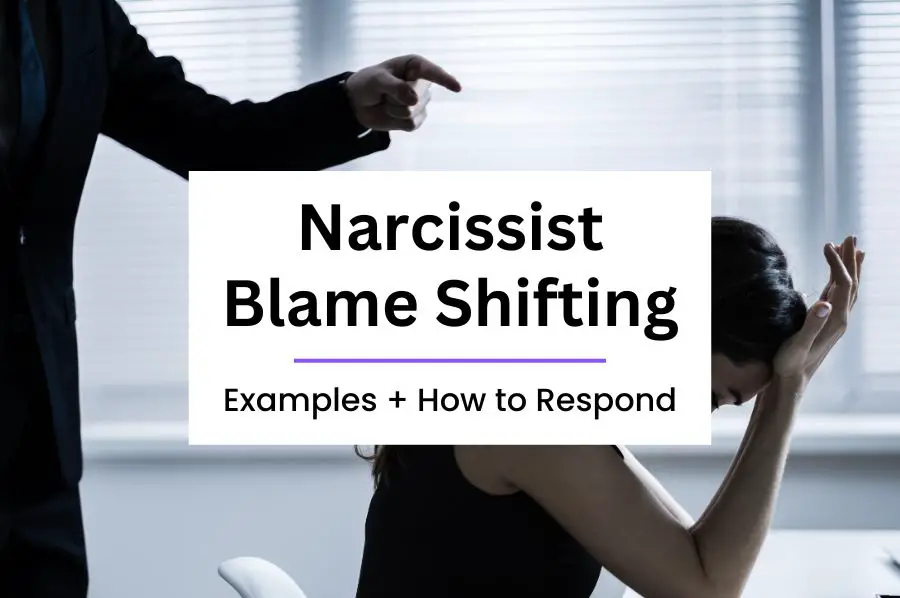
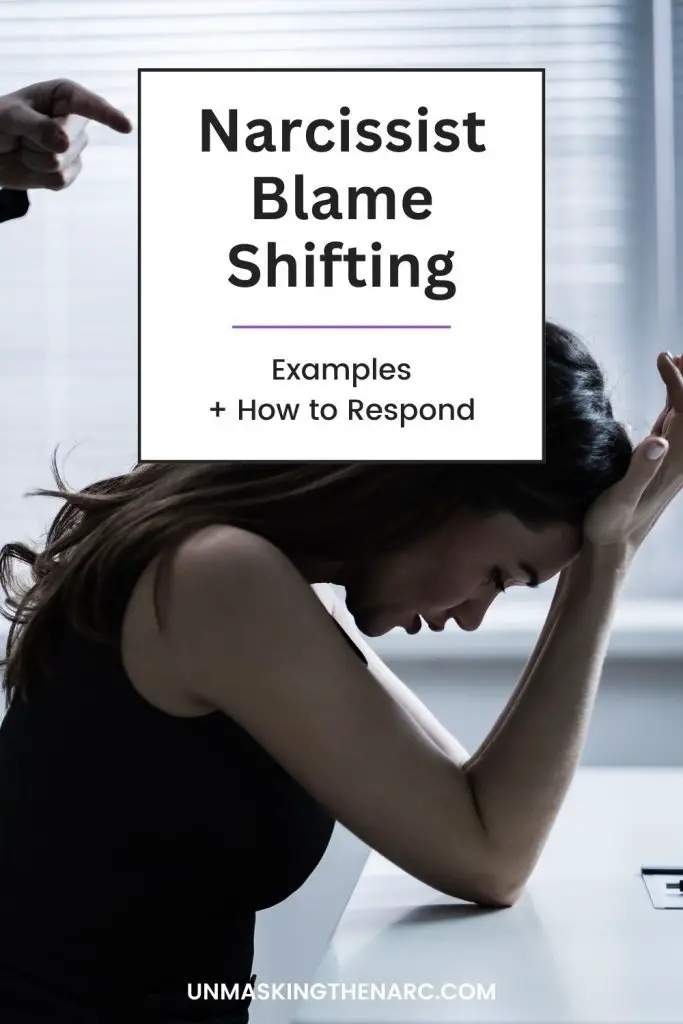
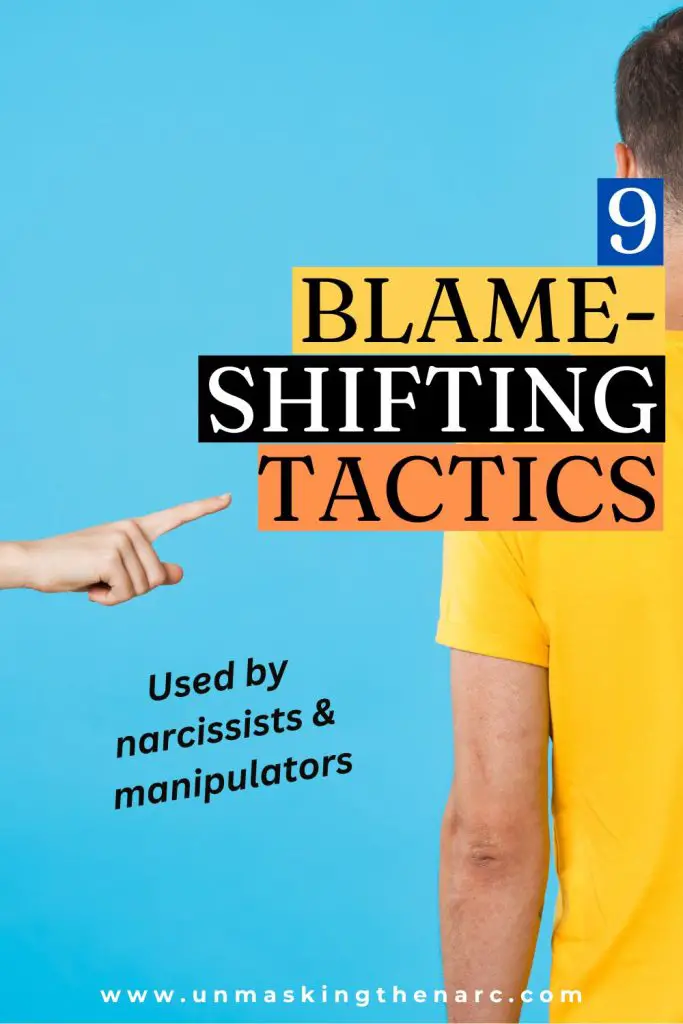


This is so on point with my current relationship, it’s frightening. I know I’m fighting a losing battle, but we have kids. I tried counselling a few yrs back. She flew into a rage at the meeting. The therapist remained impartial all through and at the end gave me a stare for 40 seconds plus. I kept looking away but his eyes remained fixed. The therapist, a well known respected professional said after, that it would be possible to work with me, but refused to work with my partner, as they refused to reflect, actually having a melt down, accusing the therapist of many false failings at the meeting. My partner still remains convinced I bought off, or influenced the therapist -again deflecting the blame. Never reflects, never admits wrong doing.. There is so much I could write here that mirrors this article. My partner truly is a Narcissist. What do I do?
I totally understand the anguish you’re going through. I also lived with it for years, first with a grandiose narc mother, then a covert narc husband. They are so utterly illogical, it’s absolutely infuriating and soul destroying. Honestly, I know you have kids to consider, but your only chance of reclaiming your own life and autonomy is to figure out a plan to leave her. Don’t take her bait by getting caught up in her delusional reality, no matter what she throws at you. This is where you have to be strong (and a few good support people will help a lot) and know that you know exactly who she is – even if she’ll never take responsibility or see it herself. You’re the sane one, trying to live a cohesive life with the insane. It ain’t gonna happen. The best advice I ever heard was this, “you can’t teach someone without a conscience how to be a decent human being.” They simply do not care. In fact, they only know how to operate from a place of victimhood and manipulation as it’s the only way they know how to get ahead in this world.
In short, she will never change. She doesn’t want to and doesn’t think she should have to. The only change that can come to the situation is with you no longer accepting it, because you deserve 1000x better than the abuse and breadcrumbs that is all she has to offer. It may be a long road, but taking that first step is the beginning of the rest of your life where YOU get to be free and happy. Two things she will never, ever know in this lifetime. In addition, it shows your kids that her behaviour is unacceptable (even without you saying a word, they’ll see it and get it as they grow older). Because they also deserve 1000x better than repeating their parents’ cycles, just like I did. Someone has to be the cycle breaker. It’s a tough gig and takes strength and courage that our predecessors may not have had.
All the best on your journey ahead. You CAN do this, one step at a time.